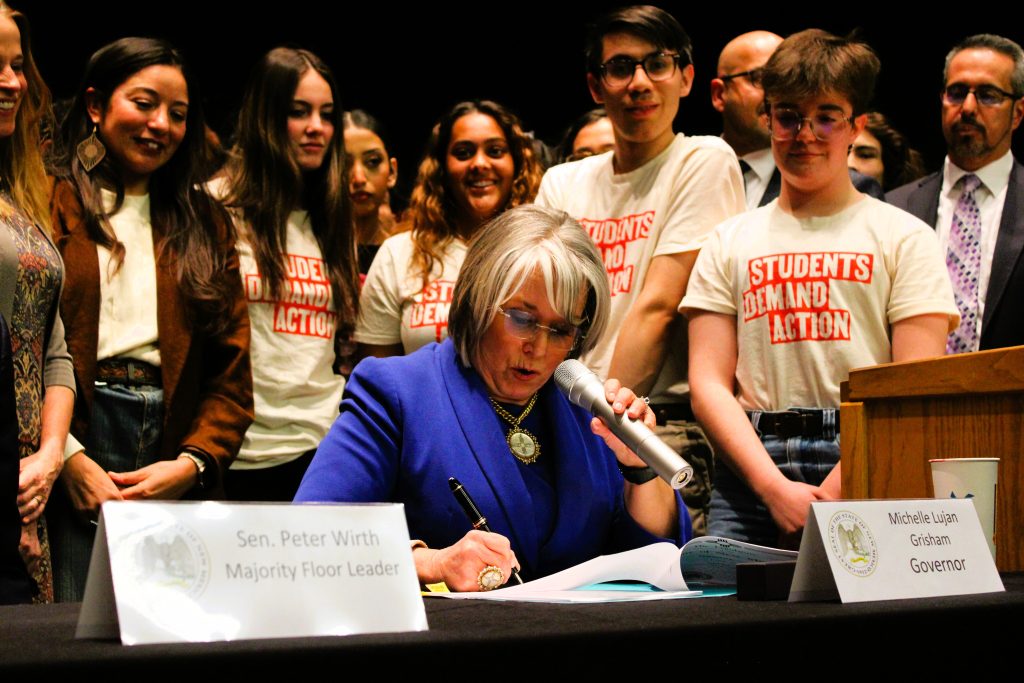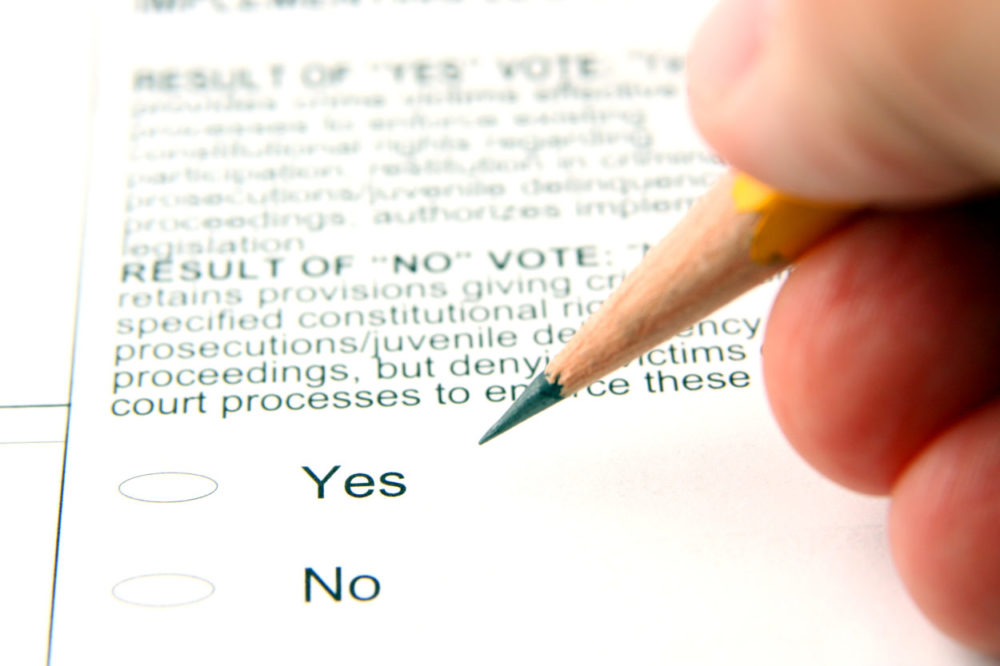This story was co-published by USA Today.
ALBUQUERQUE, N.M. — In New Mexico’s Statehouse, Jimmie Hall is something of a fixture: The veteran Republican representative has served District 28 in this sun-dried, high-desert city for seven terms.
For much of Hall’s tenure, the district, which lies along the foothills of the Sandia Mountains on the eastern edge of Albuquerque, has been reliably conservative, so much so that he’s coasted to victory without having to face any Democratic opponent in his three most recent re-election bids.
This story originally appeared at The Center for Public Integrity and is reprinted with permission.
But this year is different. In November, Hall will square off against Melanie Stansbury, who is among a slew of young, progressive Democrats running for office at every level of government across the country.
It’s a hyperlocal race to represent about 30,000 New Mexicans. What’s surprising, though, is how much others outside of the Land of Enchantment are participating in it. More than one out of every three dollars that the two candidates have raised so far came from out of state — the latest sign that America is paying attention to what happens even in the tiniest of state legislative districts in a momentous year when so much is at stake.
To fend off Stansbury’s challenge, Hall has stepped up his fundraising game: His war chest of $65,000 is already bigger than what he raised for his bids in 2016 and 2014 combined. Almost a third of it came from out of state — mostly in $400-to-$5,000 chunks from oil and gas companies based in California, Oklahoma and Texas.
Still, Stansbury has so far outperformed her opponent and raised about $124,000, netting almost 40 percent from out-of-state donors who hail from as far as Illinois, Oregon and Vermont. But her money came mostly in small amounts — as little as $1 apiece.
This level of out-of-state support isn’t unique this year, nor is Stansbury’s fundraising prowess. Nationwide, many Democrats running for state-level offices from governor to state representative are also hauling in a significant amount of donations from across state lines, according to a Center for Public Integrity analysis of campaign finance data collected by the National Institute on Money in Politics.
Though Democrats still trail Republicans in the overall fundraising tally, they have so far raised at least $101 million from out of state — about $29 million more than their GOP counterparts have taken in — as part of the newly energized “blue wave.” That’s a far cry from the 2014 elections, when Republicans ended up outraising Democrats by almost $9 million in out-of-state contributions and by $191 million overall.
The Center for Public Integrity’s analysis also found that:
-
The majority of money from out of state is going to candidates for governor and lieutenant governor — who often run on the same ticket. Together, they have raised about three-fifths of the more than $173 million from across state lines.
-
Three gubernatorial candidates — in Pennsylvania, New York and Wisconsin — have each raised at least $5.5 million from states other than their own, making up between 18 percent and 50 percent of their campaign funds. Nationwide, out-of-state contributions make up only 10 percent of direct gubernatorial fundraising.
-
Democrats running for state legislative seats are relying on a larger pool of out-of-state donors who give in smaller amounts — raising an average of about $640 per donor from more than 64,000 contributors, compared with about $2,200 per donor from more than 13,000 contributors for their GOP counterparts.
-
This gap has widened markedly compared with the same period in the 2010 elections, when an average out-of-state donor gave about $1,030 to Democrats and $1,210 to Republicans.
The influx of out-of-state contributions comes from a mix of companies with local interests, networks of contacts scattered across the country and newly emboldened national groups — on both ends of the ideological spectrum — that are mobilizing to influence state-level elections, mindful that the outcomes will have an impact on politics at the state and national levels lasting well into the next decade.
>> Reporting recipe: How to investigate out-of-state influence in 2018 races
What happens in November could determine the fate of abortion laws in the states or the future of Medicaid expansion, if the U.S. Supreme Court moves to undercut Roe v. Wade or the Affordable Care Act. And governors and many lawmakers elected this year will still be in office when the results of the 2020 census come back and redrawing of the congressional map begins — a process largely controlled by state legislatures, with many governors holding a veto pen.
With the stakes so high, the growing influence of money from out of state demands closer examination, said Dan Weiner, senior counsel at New York University’s Brennan Center for Justice, which advocates for tighter campaign finance rules. Ultimately, he said, it poses fundamental questions about state sovereignty: Who should really have a say in how each state is run?
“It is very troubling to think that people would lose control of their own electoral process,” Weiner said. “It used to be that, at least at the state level, the interests of constituents vastly outweighed any interests coming from elsewhere around the country. But that’s no longer true to some extent because of the proliferation of the campaign finance free-for-all.”
A case on limiting outsiders
In a little-known case out of Alaska, the federal courts have been weighing whether the U.S. Constitution allows states to impose limits on out-of-state contributions, an issue that could soon come to a head at the U.S. Supreme Court.
The case, Thompson v. Hebdon, is challenging Alaska’s stringent campaign finance rules that limit how much candidates for state-level offices can raise from out of state.
Wisconsin resident David Thompson filed the case after he tried to give $100 in 2015 to the re-election bid of his brother-in-law, former Alaska state Rep. Wes Keller. Thompson’s contribution couldn’t be accepted because the Republican lawmaker had already reached the $3,000 limit on out-of-state contributions to his campaign.
In challenging Alaska’s contribution limit, Thompson has adopted the same legal argument used in the Supreme Court ruling for Citizens United v. Federal Election Commission, alleging that his right to freedom of speech was violated.
The case is now pending before the 9th U.S. Circuit Court of Appeals after a lower court upheld the contribution limit.
One of Alaska’s legal arguments has been that the contribution limit is analogous to the federal ban on foreign money in U.S. elections. “Just as a Canadian citizen is not part of the political community governed by the U.S. federal government, a Florida resident is not part of the political community governed by the Alaska state government,” the state’s attorneys wrote in court filings.
But David Keating, president of the Institute for Free Speech, which supports the deregulation of campaign finance, said the analogy falls short on a fundamental point.
“It’s quite different from Russian money influencing U.S. elections,” Keating said. “Alaska isn’t an independent, sovereign state that can do whatever it wants to do. It has to respect the people’s constitutional rights just like the other 49 states do — unless, of course, it manages to secede from the country.”
Still, David Fontana, a law professor at George Washington University, said the case has the potential to reach the Supreme Court, regardless of how the appeals court rules. “This is emerging as a significant — and new enough — constitutional issue that the court might take the case, particularly because they have never fully considered the state self-government issue,” he said.
If Alaska prevails in court, it will likely embolden some states to impose similar limits, said Ron Fein, legal director of Free Speech for People, an Austin, Texas-based advocacy group that has filed an amicus brief in support of the contribution limit.
Currently, the only state outside of Alaska to have such limits on the books is Hawaii, which limits candidates for state-level offices from raising more than 30 percent of their campaign funds from out of state.
“There’s definitely going to be some increased interest in doing this,” Fein said. “The principle that a state — or even a city — should be able to limit or focus the amount of money raised in its elections to the people who are actually going to be affected by that government’s decision would resonate in many jurisdictions.”
Wisconsin governor’s race attracts national cash
The outcome of the Alaska case, of course, won’t have any bearing on the flow of out-of-state contributions into state-level elections this year — which has already exceeded $173 million, a jump of more than 40 percent from the same period in 2010.
The Center for Public Integrity’s analysis shows that a significant amount of donations from out of state has gone to some of the most competitive gubernatorial races. Topping the chart is the close contest between Wisconsin Gov. Scott Walker, a Republican seeking a third term, and Democratic challenger Tony Evers, superintendent of the Wisconsin Department of Public Instruction.
Among candidates for state-level offices, Walker has raised the most from out of state, hauling in about $11.5 million to make up more than half of his campaign funds. Evers, meanwhile, is trailing by some distance: He has so far managed to raise about $2.5 million, one-fifth of which came from across state lines.
Walker’s biggest out-of-state donor is the Republican Governors Association, a Washington, D.C.-based group he used to chair that assists Republican gubernatorial candidates. The group has so far given him $86,000. Among Walker’s top out-of-state donors are two health insurance companies — Indiana-based Anthem Inc., which gave $81,000, and Kentucky-based Humana Inc., which gave $25,000 from its Washington, D.C., office.
Walker’s out-of-state donor list also includes more than 50 individuals who maxed out the state’s contribution limit by giving him $20,000 each. The roster features prominent mega-donors from the Midwest — such as Richard Uihlein, an Illinois resident who co-founded Wisconsin-based packaging supplies company Uline, and Stanley Hubbard of Minnesota-based Hubbard Broadcasting, which owns dozens of radio and TV stations.
Hubbard, who lives in St. Paul, Minnesota, said what happens in Wisconsin is just as important to him as what happens in the North Star State. “My wife and I live right on the Wisconsin border. We go shopping and go see movies there. So it’s not like some guy in New York or Los Angeles helping out Scott Walker,” he said. “I’ve known Scott for a long time, and he’s a terrific governor who has done a great job for Wisconsin. We need more guys like him.”
The RGA, Anthem, Humana and Uihlein did not respond to requests for comment.
Jay Heck, executive director of public interest advocacy group Common Cause in Wisconsin, said the key reason why Walker gets the big bucks is that his donors see the Badger State as a lab of sorts for conservative policies.
“If you can get certain policies to succeed in Wisconsin — such as voter suppression, voter ID laws, extreme partisan gerrymandering, the destruction of the public employee unions, the right-to-work — then you can do it in almost any state in the country,” Heck said. “So I think that’s one of the reasons why you see so much money pouring into Wisconsin and into Walker’s campaign.”
Wisconsin’s governor also holds veto power over the legislatively drawn congressional map, which is mired in ongoing court challenges. This has concentrated some out-of-state attention on the race, given that the balance of power in the state will ultimately affect what happens in Congress.
Walker’s and Evers’ campaigns declined to comment. But Jonathan Wetzel, a former spokesman for the Walker campaign, defended raising money from out of state in the run-up to the 2014 elections, telling PolitiFact: “While some candidates are able to turn to a vast personal fortune to fund their campaign, we rely on folks who believe in what we’re doing and support us by contributing their hard-earned money.”
To be sure, Walker’s and Evers’ fundraising tallies can offer only a partial account of the money influencing Wisconsin politics. Following the U.S. Supreme Court’s Citizens United decision in 2010, the role of independent political groups has been growing nationwide, with hundreds of millions of dollars being raised and spent to directly influence voters in favor of specific candidates. Such groups can be bastions of out-of-state money that gets doled out to key races from offices around Washington, D.C.
Competitive races don’t always mean national donors
Outside of Wisconsin, gubernatorial races in a number of other states have also drawn the influx of out-of-state contributions.
In Iowa, for instance, Republican Gov. Kim Reynolds and Democratic challenger Fred Hubbell are in a dead heat, and the two candidates have each raised more than $2 million from out of state to make up about 30 percent and 24 percent of their campaign funds, respectively.
The Center for Public Integrity’s analysis, however, found that not all competitive gubernatorial races attract money from out of state.
Illinois’ gubernatorial race, for instance, features Republican Gov. Bruce Rauner and Democratic challenger J.B. Pritzker, both multimillionaires who have largely self-funded their own campaigns and raised little from out of state.
In Nebraska, meanwhile, Republican Gov. Pete Ricketts has been doing the opposite, proving that a wealthy gubernatorial candidate who appears to be coasting to victory in November can still attract money from out of state. The multimillionaire co-owner of the Chicago Cubs has hauled in more than $1.2 million from across state lines to make up more than a third of his campaign funds.
The fight for New Mexico
In contrast to gubernatorial races, the vast majority of races for state legislative seats don’t carry the flash and cash: The average 2018 candidate has so far raised only $72,000, about 11 percent of which came from out of state.
This means sudden injections of money from out of state, even in relatively small amounts, could have an outsized impact. This year, they could even play a decisive role in altering the balance of power in some states.
In New Mexico, what’s at stake is Democrats’ chance at securing a “trifecta” of state control over the governor’s mansion and both chambers of the Statehouse. Like in Wisconsin, state lawmakers there are the ones who will redraw the congressional map after the 2020 census, and the governor holds veto power over it.
According to the latest polls, Democratic gubernatorial nominee U.S. Rep. Michelle Lujan Grisham, who has raised about $1.4 million from out of state, is favored to succeed term-limited Republican Gov. Susana Martinez.
Against this backdrop, the contest between Hall and Stansbury in District 28 is shaping up to be one of the key match-ups.
Hall and Stansbury are a study in contrasts. He’s a seasoned politician, 70, with traditional conservative views, a lifetime National Rifle Association member who’s endorsed by one of New Mexico’s anti-abortion groups. She’s a political newcomer, 39, with progressive views, an environmental consultant who has gone through training at nonprofit Emerge New Mexico, which cultivates the next generation of Democratic women leaders.
Hall and Stansbury also have similarly divergent lists of out-of-state donors fueling their campaigns.
Hall’s biggest donors are California-based oil giant Chevron Corporation and Oklahoma-based oil producer Devon Energy Corporation. The companies have each given him $5,000, the maximum allowed in New Mexico for individuals and businesses. He has also raised $2,500 and $1,600, respectively, from Occidental Petroleum Corporation and ConocoPhillips — both oil and gas companies based in Texas.
In all, Hall has raised $21,250 from more than a dozen out-of-state donors — including $16,000 from oil and gas companies — to make up 32 percent of his campaign funds, according to state records.
Hall defended taking money from oil and gas companies, saying all of his donors — unlike his opponent’s, he said — are “people and companies that live or have businesses here in New Mexico.”
Devon Energy, Occidental and ConocoPhillips did not respond to requests for comment.
In a statement, Chevron spokesman Sean Comey told the Center for Public Integrity that the company donates to political campaigns “to support the election of candidates who promote the responsible development of oil and natural gas resources.” He added: “Our contributions are made in accordance with the law.”
Stansbury, meanwhile, has been relying on a larger pool of out-of-state donors. Her biggest donor is EMILY’s List, a Washington, D.C-based group focused on electing Democratic women who support abortion rights. The group has given her $5,500, the maximum allowed in New Mexico for political action committees. She has also raised $2,500 each from California-based mega-donor Tom Steyer and his wife, Kat Taylor, as well as from a Washington, D.C.-based union that represents workers in the food, grocery and retail industries nationwide. The rest of her money from across state lines has so far come from more than 270 donors who gave an average of about $130 — including at least 120 donors who each gave $50 or less.
In all, Stansbury has raised about $48,000 from out of state to make up 39 percent of her campaign funds.
Stansbury, who has rejected corporate contributions, said her donor list is a reflection of her network of friends and family members — many of whom are scattered across the country.
Among them is Matthew Hoffman, a Vermont resident who teaches sociology at the University of Southern Maine. Hoffman, who met Stansbury while attending graduate school at Cornell University, has given her $25 on four different occasions. The only other time he’s donated to a political campaign was for Bernie Sanders’ presidential run in 2016.
Hoffman said his main motivation for contributing to Stansbury’s campaign is his belief that candidates like her can usher in change that acts as “an important counterbalance” to what’s going on in national politics.
“After the Women’s March on Washington, I know that lots of women like Melanie were inspired to run for local office, and that’s a very exciting and brave thing to do,” Hoffman said. “Most of the important political changes that are needed — and likely to happen — in the U.S. are going to take place at the state and municipal levels. That’s the place to look for change, so it’s important to have people like Melanie running for office.”
To some residents of District 28, however, the influx of out-of-state contributions is yet another thing that feeds into their cynicism about politics and politicians.
Patty Lovell, who was holding a garage sale on a recent Saturday morning in front of the house that she’s lived in for almost 20 years, said she feels like “outsiders are always meddling in our business” in New Mexico, and that’s one of the reasons why she’s so turned off by politics.
In 2016, residents in the district narrowly voted for Hillary Clinton, indicating that the political center of gravity there might have shifted to the left in recent years. But Lovell said she didn’t cast her ballot two years ago — and likely won’t vote in November.
“I’m just fed up with politicians,” Lovell said. “They have no intention of serving the interests of their constituents. So why should I vote for any of them?”
Hall is counting on the residents who do turn out to vote to recognize his name and his yearslong record of representing the district to carry the day for him. “I’ve got a long record, which is very conservative, and I’m running on it,” he said.
For her part, Stansbury has opted not to resort to partisan rhetoric to hammer away at her opponent. Instead, she’s focused her energy on canvassing the district every night and encouraging people of all political persuasions to vote.
“What we’re trying to do is not really political. It’s really about trying to lift up our community,” Stansbury said. “New Mexico is filled with huge richness of amazing scientists and engineers and creative people and resilient communities. So what I’m interested in is seeing how we can harness the collective wisdom to help solve the problems that our state faces.”
Stansbury’s get-out-the-vote campaign will also prove critical for another reason: Her fundraising prowess won’t necessarily translate to success at the polls.
Out-of-state donors, after all, can’t turn out on Election Day.
Liz Essley Whyte contributed to this report.























